Hard water contains calcium and magnesium ions that chemically bond with soap molecules, creating insoluble soap scum instead of lather. You'll notice stubborn residue on surfaces, stiff laundry, and dull hair as the minerals neutralize soap's cleaning power. This forces you to use up to 50% more soap with disappointing results, while also damaging appliances over time. Understanding this chemistry reveals why simple water treatment can dramatically improve your cleaning effectiveness.
How Hard Water Ruins Your Soap Results
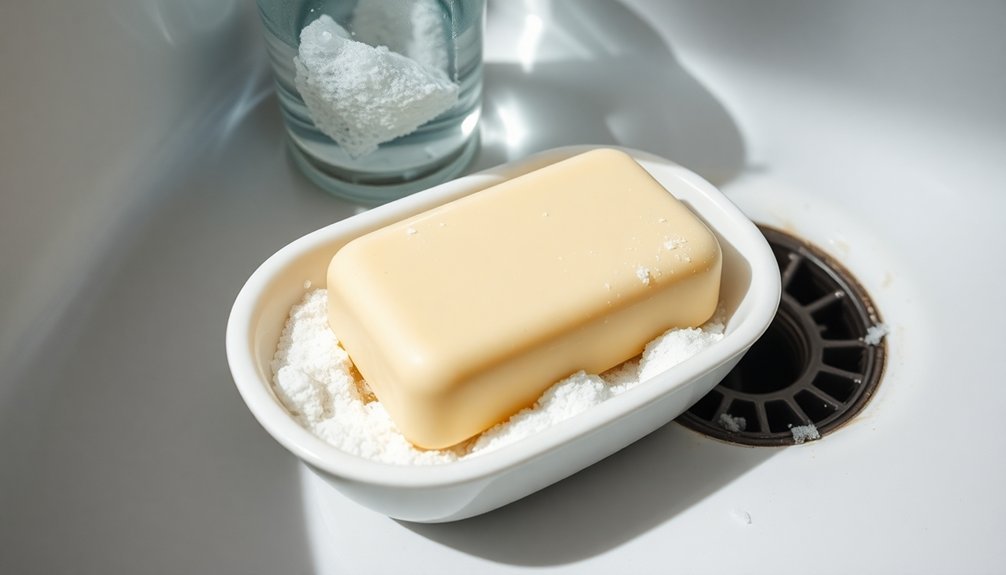
When you struggle with stubborn soap scum and disappointing lather, hard water is likely the culprit. The high concentrations of calcium and magnesium in your water supply actively fight against your cleaning efforts by bonding with soap molecules, forming those frustrating insoluble residues.
You'll notice you're using more soap than necessary just to achieve basic cleaning effectiveness. This isn't just wasteful—it's counterproductive. The soap scum doesn't just disappear; it clings to your shower walls, sink surfaces, and even clogs your drains over time.
Your laundry suffers too, as fabrics emerge from washing feeling unexpectedly stiff and scratchy. The reality is that hard water creates a cycle of poor rinsing and residue buildup that affects everything from your skin to your household surfaces.
The Chemistry Behind Hard Water and Soap Interaction
When calcium and magnesium ions in your hard water meet soap molecules, they form insoluble compounds called soap scum through a process chemists call precipitation.
This mineral-soap reaction doesn't just create unsightly residue—it actively consumes your soap's cleaning agents, leaving fewer molecules available to create the rich lather you expect.
You'll notice immediately that your soap produces fewer suds in hard water, requiring more product to achieve the same cleaning power you'd get with soft water.
Chemical Reactions Explained
Although soap seems simple to use, its effectiveness depends on complex chemical interactions that occur at the molecular level.
When you use soap in hard water, the calcium and magnesium ions immediately begin competing with your cleaning efforts. These minerals react with the fatty acid components of soap, forming insoluble compounds known as soap scum.
This reaction converts your effective soap molecules into useless precipitates that can't perform their cleaning function. Instead of creating a rich lather that captures dirt and oils, your soap forms these stubborn, insoluble compounds that cling to surfaces.
The more calcium and magnesium present in your water, the more soap molecules are neutralized, leaving fewer active molecules to clean effectively. This explains why you need more soap in hard water regions and why your results often remain disappointing.
Mineral Precipitation Process
The precipitation of minerals forms the core chemical phenomenon behind soap's poor performance in hard water. When your soap meets water with high mineral content, calcium and magnesium ions immediately begin attacking the soap molecules.
These ions fundamentally hijack the soap's fatty acids, triggering a chemical reaction that transforms your cleaning agent into insoluble soap scum.
This precipitation happens rapidly—the moment your soap touches hard water, these minerals bind to the soap molecules, rendering them useless for cleaning.
What you're left with is that familiar sticky, chalky residue clinging to your shower walls and sink surfaces. This process not only wastes up to 30% more soap but also gradually builds up in your plumbing, potentially leading to clogged drains and damaged fixtures over time.
Diminished Lathering Effect
Despite your best efforts with regular soap, hard water's stubborn chemistry actively sabotages your cleaning routine by dramatically reducing lather formation.
This diminished lathering effect occurs because calcium and magnesium ions in hard water bind to soap molecules, creating insoluble compounds that can't perform their cleaning function.
You'll notice you need more soap to achieve minimal suds, as these minerals fundamentally neutralize a portion of your soap on contact.
The soap molecules that should be capturing dirt are instead busy reacting with minerals. This not only wastes product but also creates that frustrating soap scum residue on your skin, hair, and surfaces.
What you experience as difficulty rinsing isn't actually soap remaining—it's the newly formed precipitate that feels sticky and unpleasant.
Signs Your Soap Performance Is Suffering From Hard Water
Ever wondered why your cleaning efforts aren't yielding the results you expect? Hard water might be the culprit. The most obvious sign is stubborn soap scum—that sticky residue clinging to your shower walls, tubs, and sinks despite regular cleaning. This occurs when your soap's ability to clean is compromised by calcium and magnesium minerals.
You'll notice other hard water issues throughout your home. Your clothes feel stiff and scratchy after washing. Shampoo doesn't rinse completely, leaving your hair dull while your skin feels dry and irritated.
Glassware and dishes emerge from washing with a cloudy film, even after thorough cleaning. If you're using more soap than seems reasonable yet getting disappointing results, your water hardness is likely sabotaging your cleaning routine.
Mineral Buildup: What Happens to Soap in Hard Water Areas
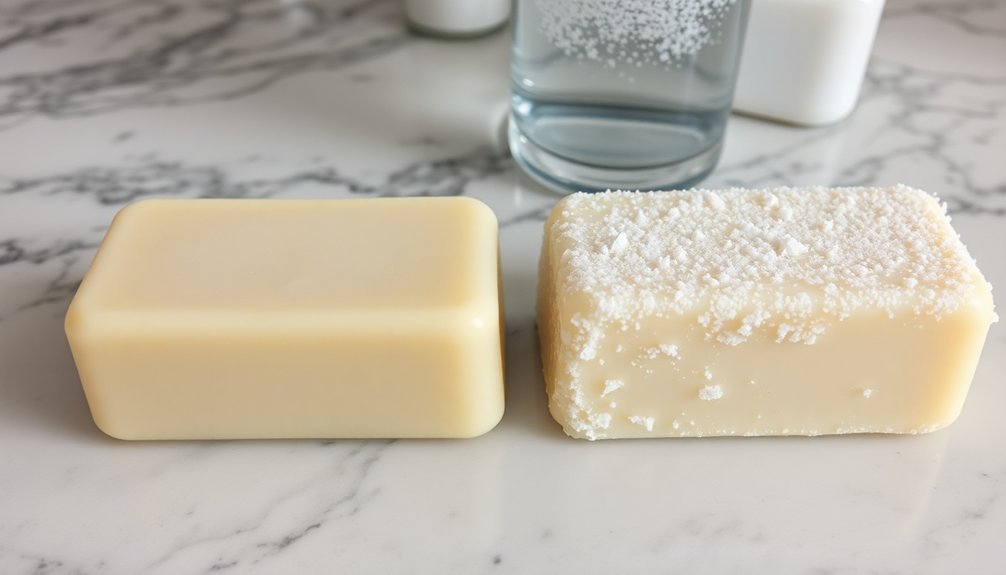
When soap meets hard water, calcium ions immediately bond with soap molecules to form an insoluble "calcium soap" that reduces effectiveness and prevents proper lathering.
You'll notice your soap producing fewer bubbles and requiring more product to achieve any cleaning power, as the minerals fundamentally neutralize the soap's active ingredients.
The frustrating white residue left on your fixtures, shower doors, and even your skin is this calcium soap precipitate—a chalky combination of minerals and soap that clings to surfaces rather than rinsing away.
Calcium Soap Formation
The chemical battle between soap and hard water creates a frustrating phenomenon in millions of households. When you wash with soap in hard water, the calcium and magnesium minerals instantly react with fatty acids in your soap, forming what chemists call "calcium soap" – an insoluble compound that's the main component of soap scum.
This reaction isn't just visually unappealing. As water hardness increases, more of your soap gets wasted in this chemical reaction instead of cleaning your surfaces or skin.
You'll notice reduced lathering, requiring you to use more product for the same cleaning power. Meanwhile, the sticky residue clings to everything from shower walls to your clothing fibers, leaving fabrics stiff and potentially irritating your skin.
Over time, this scum can also accumulate in pipes, creating plumbing headaches.
Reduced Lathering Effect
Despite your best efforts, you'll notice markedly diminished suds when using soap in hard water regions. This reduced lathering effect occurs because calcium and magnesium ions in hard water immediately bind with soap molecules, preventing them from interacting properly with water.
When this happens, you'll experience:
- A sticky residue that makes your skin feel like the soap hasn't completely rinsed off
- The need to use markedly more product to achieve minimal cleaning results
- Frustration as you waste money on soap that's being neutralized before it can clean effectively
- Gradual soap scum buildup on shower walls, tubs, and sinks
This mineral interference means your cleaning products can't perform as designed, leaving surfaces and fabrics less clean despite using more product.
White Residue Causes
Four key minerals actively create that frustrating white film you've noticed on your shower doors and fixtures. When calcium and magnesium ions in hard water meet your soap, they immediately form insoluble compounds called soap scum.
This white residue isn't just unsightly—it's problematic. This chemical reaction occurs because the minerals bind with fatty acids in your soap, preventing proper lathering and reducing cleaning effectiveness. You'll find yourself using more product to achieve results that would come easily with soft water.
Beyond surfaces, soap scum infiltrates your plumbing, potentially causing clogs and increasing maintenance costs. The residue doesn't just affect your bathroom—it impacts your skin and hair too, leaving behind a film that prevents thorough rinsing, resulting in dryness and dullness.
The Hidden Costs of Using Soap With Hard Water
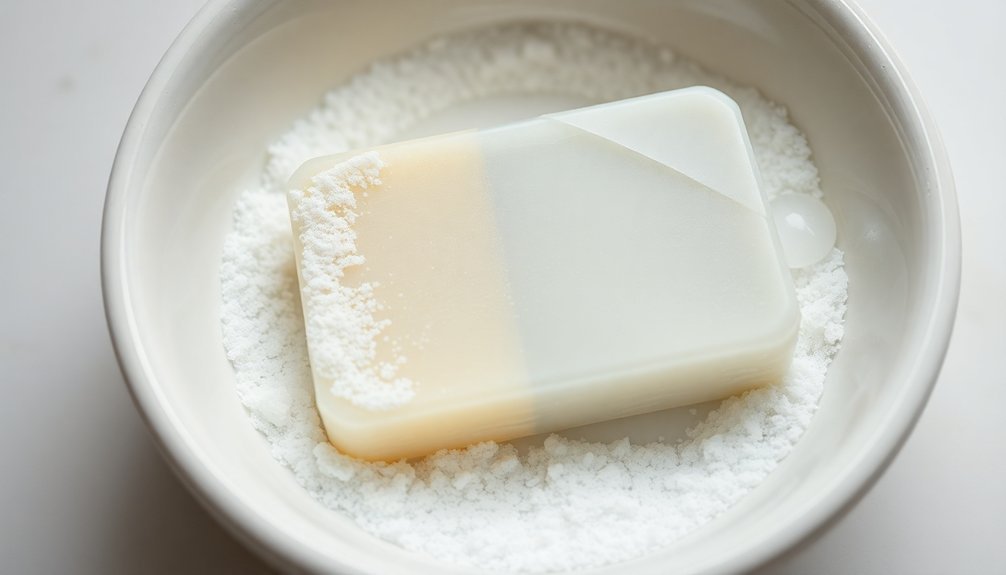
When you consider the long-term impact of hard water on your household, financial consequences extend far beyond simply buying more soap.
The calcium and magnesium ions in hard water create persistent soap scum that damages both your belongings and budget.
Here's how hard water secretly drains your wallet:
- Increased soap consumption – You'll use up to 50% more cleaning products to achieve the same results.
- Higher utility bills – Appliance efficiency drops as soap residue builds up.
- Premature appliance replacement – Dishwashers and washing machines suffer shortened lifespans.
- Fabric replacement costs – Your towels and clothing wear out faster from the stiffness and abrasion caused by embedded soap residue.
These hidden expenses accumulate silently, making hard water treatment a smart financial investment.
Water Softening Solutions for Better Soap Efficiency
Because hard water wreaks havoc on soap's effectiveness, investing in water softening technology offers immediate and substantial benefits to your home.
A whole-house water softener removes the calcium and magnesium ions that prevent soap from lathering properly, instantly improving cleaning results throughout your home.
You'll need to maintain your system by adding salt regularly to guarantee consistent soap efficiency.
For a simpler approach, try adding white vinegar to your laundry loads—it naturally softens hard water and helps soap work better while preventing scum buildup on fabrics.
The benefits extend beyond cleaning—you'll notice healthier skin and hair as soap can now function as intended.
Plus, your appliances will run more efficiently, and household cleaning challenges will dramatically decrease with properly softened water.
Frequently Asked Questions
Does Hard Water Make Soap Less Effective?
Yes, hard water makes your soap less effective. It's high in calcium and magnesium that react with your soap, forming insoluble scum. You'll notice reduced lathering and need more soap for cleaning.
What Happens When Hard Water Reacts With Soap?
When hard water reacts with soap, you'll notice less lather forming as minerals bind with soap molecules, creating soap scum. This insoluble residue clings to surfaces, makes your skin feel dry, and reduces cleaning effectiveness.
How Does the Hardness of Water Affect Soap Consumption?
You'll use more soap with hard water because calcium and magnesium minerals neutralize soap's effectiveness. They create scum instead of lather, forcing you to add extra product just to achieve basic cleaning results.
How Does Hard Water Affect Detergent?
Hard water diminishes your detergent's effectiveness by forming insoluble compounds with calcium and magnesium ions. You'll use more product, get less lather, and notice residue on clothes and appliances. It's costly and damaging.
In Summary
Hard water is quietly sabotaging your soap experience. You're not only dealing with reduced lather and residue buildup but also spending more money on products that can't work properly. Whether you choose a water softener, specialty soaps, or simple DIY remedies, addressing your hard water problem will transform your cleaning results and extend the life of your plumbing and appliances.
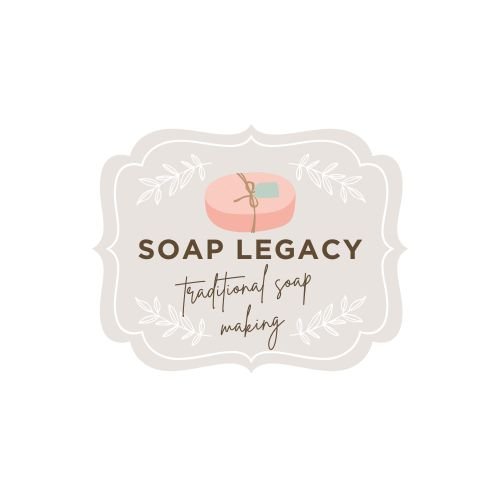
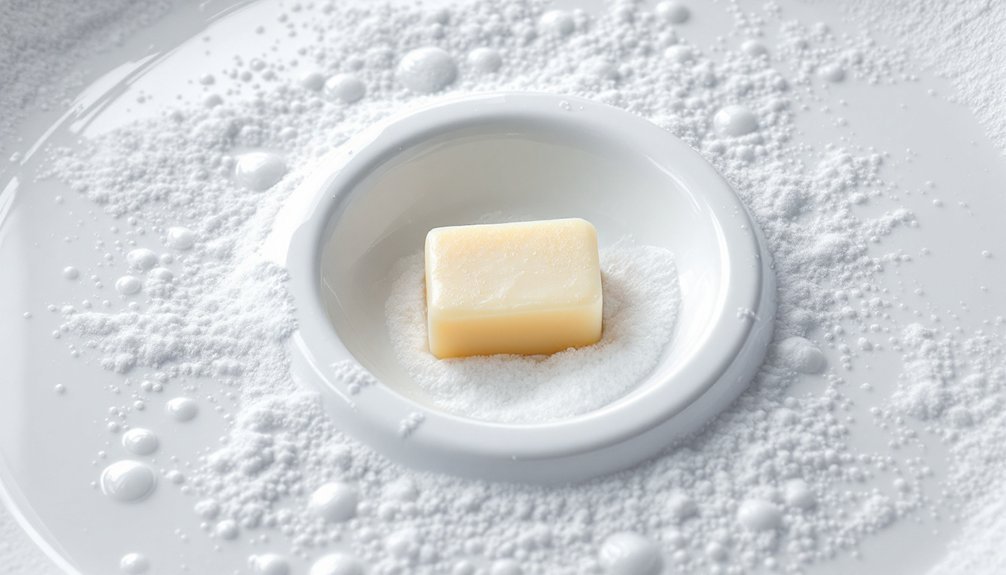
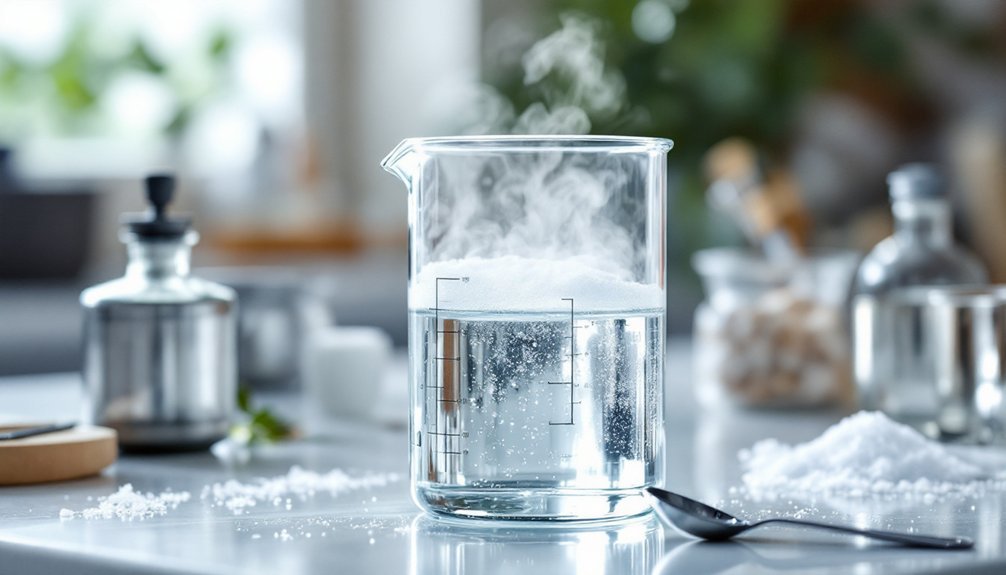
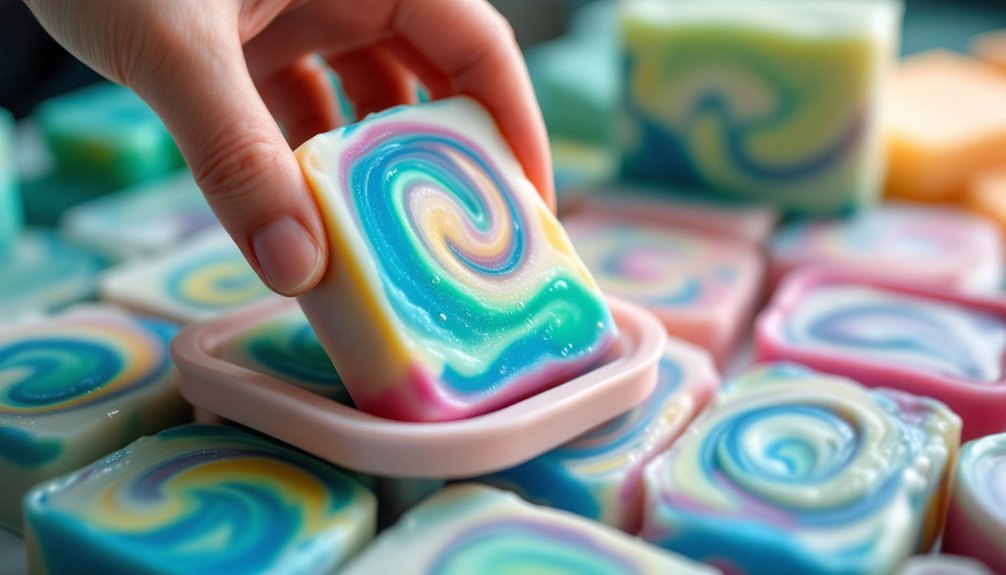

Leave a Reply